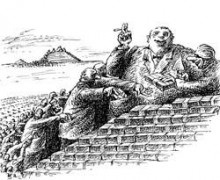On Thursday, Oct. 25, Ukraine’s news agencies came up with two headlines: the Atlantic Council urges the Ukrainian political leadership to combat corruption, and the BYuT suspects the Kyiv City Council of bribing the Prosecutor General’s Office with plush apartments. The latter headline is graphic evidence of the former.
Corruption and the local mafia seem to be never-ending in Ukraine. Both Kuchma and Yushchenko have struggled against them. At one time President Kuchma decided to set up a National Investigation Bureau, and he even signed a decree to this effect. Funds from the state budget were allocated, but after winning the second round of the presidential elections in 1999 and pressured by his associates, he canceled it.
President Yushchenko has also made attempts to combat the mafia and corruption. In the spring of 2005 he announced that he was setting up the National Investigation Bureau, but no steps have been taken in this direction because of his “dear friends” or those who came in their stead. No one is surprised to hear that the General Prosecutor’s Office and the Kyiv City Council are suspected of corruption. We have been through all this and more. We have even developed a kind of immunity against kompromat, compromising or incriminating material, although people in the West are still aghast at our omnipresent corruption.
The latest findings of the Atlantic Council read that the scope of corruption in Ukraine is such that it “can threaten economic growth and national security.” Steven Pifer, former US ambassador to Ukraine and a member of the Atlantic Council, says that despite the fact that experts have called the latest parliamentary elections in Ukraine free and fair, where corruption is concerned the trends are not so positive. Above all, the new Ukrainian government must uproot corruption with complete support from parliament. This includes cleansing the judicial system, severing all ties between government and business, and cooperating with parliament to pass anti-corruption bills.
The Atlantic Council’s report suggests steps that the Ukrainian political leadership must take to combat large-scale corruption and steps that lower-level bureaucrats should adopt to prevent minor corruption. In particular, the Council proposes that Ukraine establish an independent national investigation bureau and every year publish declarations about income and property owned by state officials.
The Day asked some of our legislators whether overcoming corruption is a possibility and how to go about it.
Volodymyr STRETOVYCH, Our Ukraine — People’s Self-Defense (NU-NS):
Corruption as a disease of power exists in every state. However, in countries with advanced civil institutions and normal ideological parties — emphasis on “ideological,” rather than “personal” — there is less of it. Add here the historical tradition. Today, corruption is mostly combated with words. Any politician, any candidate for an influential post promises to overcome corruption.
The Atlantic Council’s findings on corruption threatening Ukraine’s economic growth are absolutely valid. They are perfectly right. Corruption is a disease in which the rich man becomes richer and the poor man becomes even poorer. Hence a society with unequal opportunities, which is so stratified that there is no chance of even discussing the possibilities of unity and well-being. Most of today’s corrupt operators appeared in the mid-1990s, when they were known for what they were: criminals and racketeers, who have now come into power and made a place for themselves in offices. Under the circumstances, one can only hope for the advent of the new generation, people who will seriously set about building Ukraine. Corruption is a huge problem that will eventually disappear, because this is the dialectic of progress. But the trouble is that we have already lost much.
Taras CHORNOVIL, Party of Regions:
The situation with corruption is far from the best, but the data being imposed on us often proves to be simply inadequate. The Atlantic Council’s statement is, frankly speaking, a serious overstatement.
How to overcome corruption? Of course, you can throw a billion hryvnias into an anti-corruption campaign, but this billion will also go to certain corrupt schemes: through the corrupt Tender Chamber of Ukraine a corrupt anti-corruption tender can be announced. Then this money will be stolen by corruption. Then this money may be used to bribe the Atlantic Council so that it will issue positive findings about us, declaring that all this money was effectively used in the struggle against corruption.
There is only one way to combat corruption: legislated tax regulation that will make corruption increasingly less profitable. There is no way to overcome corruption as such. Corruption has never been overcome in any country; it is omnipresent and will exist come what may. We can struggle against it by destroying its foundations. For example, simplifying the taxation system and easing the tax burden would automatically lower the corruption rate. These are the kinds of methods we should use. I don’t see any alternatives. All the rest means using corruption mechanisms for unlawful enrichment.
* * *
More than 99 percent of Donetsk residents are convinced that the best punishment for corrupt officials is a prison term. They also believe that a list of corruption ratings should be set up so that people can see what their public servants are up to. This idea was expressed during a poll conducted by the Donetsk Civic Committee in support of the bill “On the Honest Conduct of Persons Empowered to Carry out State Functions.” The first stage of the survey, which took place on Donetsk’s central square, involved over 3,000 residents, 99.7 percent of whom support the idea of handing down severe punishments to bureaucrats who use their positions for personal benefit.







